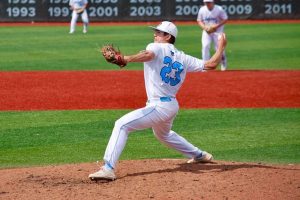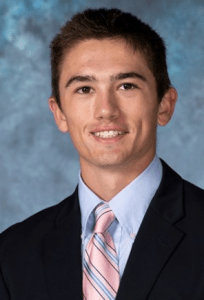
Pitchers like Justin Verlander of the Houston Astros or Clayton Kershaw of the Los Angeles Dodgers often make getting batters out look simple and effortless. However, most pitchers, especially younger ones, struggle to let go of the bad body mechanics – especially throwing motions and grips – that became habits when they first started playing the game as children.

Brian Linton
Brian Linton can relate. A third-year student in the Department of Electrical and Computer Engineering and a pitcher for the Johns Hopkins Blue Jays, Linton has struggled at times to make adjustments that will help make the ball do exactly what he wants. So, when Linton was offered a chance to use his engineering knowledge and experience as a pitcher to help other athletes improve their performances through an internship last summer, he jumped at the chance.
Linton worked for Baseball PDS, a Huntingdon Valley, PA-based business co-founded by former JHU pitcher Chez Angeloni, who graduated with an economics degree in 2009. The organization provides high-end baseball training and player development for clients playing in every level from Little League to the pros.
Linton’s focus was on enhancing pitcher development—specifically, using his ECE background to work with technologies aimed at helping pitchers make the most of their abilities. One such technology tool is Rapsodo, which uses Doppler Radar to track a baseball’s flight, providing metrics on which the ball is spinning, how fast the ball is traveling, and the number of rotations the ball makes before reaching home plate, among others. These metrics help pitchers tweak their body movements to make the ball go faster, or to hit the catcher’s mitt more accurately.
“Each day, I studied theories and methodologies related to the art of pitching, with subjects ranging from the physics of the flight of the baseball to breathing strategies for better mental performance,” Linton said. “I would then test and implement my findings on both myself and other pitchers as we strove to become the best we could be.”
Linton came away from the internship with a greater appreciation for the intricacies of the sport, saying he learned that baseball “is far more complex than simply home runs and strikeouts.” He became a better pitcher, too – Linton is excited to unveil his new changeup next season after spending the summer sifting through a variety of grips until he felt comfortable with one that gave him the results he wanted.
Linton says the experience also gave him a new appreciation for what he has learned during his first two years at JHU. Some concepts Linton learned in class, such as the Fourier Transform, were helpful in understanding how the technologies worked. He also used information he learned in his Physics 1 course, such as the Magnus Force and Drag due to the seams on the baseball to interpret and analyze ball flight patterns and motion.
More than anything, though, the experience made him appreciate the problem-solving skills he has learned in his ECE courses.
“This internship taught me that ECE is not only applicable to circuit boards and logic gates. While these are important topics, the skills and values taught in the ECE program can be applied far beyond the lab,” Linton said. “Being able to think on your feet and improvise when the fundamentals break down is essential to being a good engineer, as well as a good athlete and coach. This opportunity at Baseball PDS was a great blend of my ECE major and my passion for baseball, and it is an experience that I will remember for the rest of my life.”